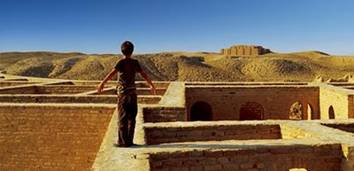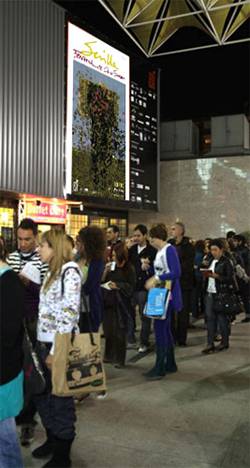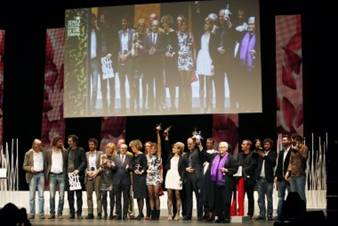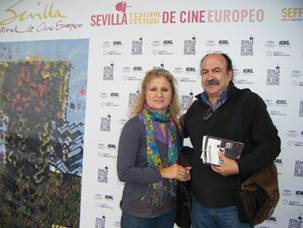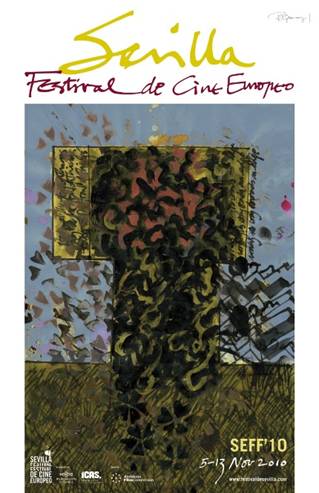 SEVILLA FESTIVAL DE CINE EUROPEO 2010
SEVILLA FESTIVAL DE CINE EUROPEO 2010

SEVILLA FESTIVAL DE CINE EUROPEO 2010
MIGUEL JIMENEZ-EL TALLER DE ZENON.
En los días precedentes al inicio del Festival (celebrado del 5 al 13 de noviembre) su director, Martín-Domínguez, nos adelantaba una idea general del mismo:
“el SEFF'10 --que cuenta este año con un presupuesto de 1,7 millones de euros-- pretende ser un Festival activo, actual, colorista y de amigos, que sigue consolidando su presencia pública en los medios, que ha crecido un 600 por cien en los dos últimos años, y en el que habrá una mayor presencia de películas españolas".
Para este SEFF’10, la Organización ha mantenido la estructura habitual, es decir las secciones a concurso (la oficial y la de documentales), mas la muestra de películas seleccionadas para los premios de la Academia Europea (EFA) y las cintas cofinanciadas con el fondo europeo EURIMAGES; pero ha incluido algunas novedades interesantes como el premio al director novel, sección “First Films First”, y la celebración de los 20 años del Canal ARTE con la proyección de filmes donde participa el canal franco-alemán.
Para alguien ajeno lo más sorprendente puede ser precisamente la cantidad de secciones en la que se dividen las películas. 26 categorías para clasificar más de 150 films, una desmesura a la que añadir los pases de prensa mañaneros, donde actores, directores y demás deben superar el sueño y contestar las preguntas a las 9 de la mañana, o la cantidad inabarcable de conferencias, presentaciones, y charlas sobre el mundo del cine.
Y sin embargo la organización logra acercarse a los habitantes de a pié, no solo por el número de películas y géneros, sino por la cantidad de días que abarca y el precio realmente asequible, así el público estudiante, fiel siempre, se muestra entusiasmado y responde llenando las salas. Y todo ello aún continuando con la incomprensible costumbre de no publicitar apenas el Festival en la ciudad; como en ediciones anteriores nos preguntamos la causa de tal ocurrencia que hace que en muchas zonas de la ciudad no se sepa que se está celebrando un festival de cine de categoría cuando debería estar medio inundada de cartelería que informase tanto a los no iniciados como a los visitantes de su existencia y les guiasen prácticamente hasta sus sedes.
De la apabullante oferta del certamen destacamos la sección oficial, cómo no, la dedicada a grandes directores, este año homenajeando a Frears, Vicente Aranda y Manoel De Oliveira, la celebración del cine Holandés (Wild Tulips, con 13 títulos), y la selección EFA (de las películas pre-nominadas por la European Film Academy, algunas de las cuales ya eran conocidas gracias al festival de cine de Londres).
Pero entremos ya con el palmarés de este año y veamos algunas películas, a nuestro parecer interesantes, y que han resultado premiadas o no. Adelantamos también la sensación de una mayor calidad general en los trabajos presentados y una mayor diversidad en los géneros, especialmente en relación a ediciones anteriores en las que a veces se encontraban trabajos desiguales en su presentación final y una mayor monotonía ( leasé hastío) en los guiones.
GIRALDILLO DE ORO SECCIÓN OFICIAL y PREMIO JURADO CAMPUS:
SON OF BABYLON de Mohamed Al-Daradji (Irak, Reino Unido, Holanda, Francia, Emiratos Árabes, Egipto, Palestina)
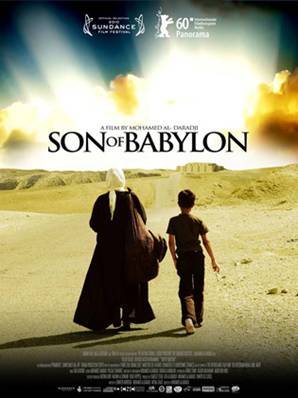
Se trata realmente una película excepcional, con un altísimo nivel de interpretación y de fotografía por citar algunos aspectos del film. Cinta ya premiada en Sundance, se elabora gracias a una estructura de road movie. La película narra cómo tres años después de la caída del régimen de Saddam Hussein, Ahmed, un niño kurdo de 12 años, recorre las carreteras del norte de Irak con su abuela. Ambos buscan al padre del niño, un soldado arrestado por la Guardia Republicana de Saddam al final de la Guerra del Golfo. En su búsqueda viajan por caminos devastados por las bombas y se cruzan con otras personas en la misma situación; todos viajan en busca de alguien, de una nueva vida y de un futuro.
Siguiendo el rastro de Ibrahim, la pareja protagonista vivirá todo tipo de situaciones, y el espectador pronto se unirá a su dolor.
Y es que el largometraje es duro, muy duro. La cinta ahonda en el sufrimiento del pueblo iraquí, antes y después de la derrota de Sadam. El paisaje desolado está en consonancia con las ciudades destruidas, y la ausencia de gente en el campo sin vegetación contrasta con la aglomeración en los puntos de salida y llegada de los refugiados, o de las personas que salen a buscar a sus familiares desaparecidos. Lo harán en autobuses que ya han rebasado ampliamente varias vidas útiles; y se cruzarán en el camino con los controles norteamericanos, mientras divisan a lo lejos el humo de los incendios que señalan la destrucción.
Al Daradji rueda en la propia Irak y se vale de actores no profesionales, de los que destaca la actuación de la pareja protagonista. La emoción en la interpretación no puede ser más real: la actriz que da vida a la abuela sufrió en sus carnes la desaparición de un familiar. Mientras, el niño que hace de Ahmed parece que lleve actuando toda la vida. Los cambios de registro, desde la desesperación cuando busca a su padre, hasta la alegría cuando se entera que van a pasar cerca de los Jardines Colgantes de Babilonia, y que incluso tendrán la oportunidad de verlos, son un prodigio.
Algunas declaraciones del director en la rueda de prensa posterior pueden ayudarnos a entender algunos aspectos del film :
“Cuando decidí llevar al cine la historia de los cientos de desaparecidos, enterrados en fosas comunes durante la Guerra de Irak, tenía claro que iba a ser difícil. Por un lado, porque Ahmed, el niño que protagoniza la película, “era yo mismo” y, por otro, porque “rodar en Irak es una pesadilla”.
“Un día, caminando por las calles de Bagdad, escuché en la radio que habían descubierto fosas comunes y pensé en mi tía, porque ella había perdido su hijo en la guerra de Irán e Irak”, ha comentado.
Para encontrar a esta abuela que no se resigna a perder a su hijo, recorrió muchos pueblos de Irak. “En su pueblo llamé a unas 25 casas y todas las mujeres que me recibían me contaban historias de este tipo y se ponían a llorar”, ha narrado el director, “pero ella no lloró, aunque tenía la tristeza en sus ojos, y en ese momento supe que podía protagonizar mi película”, cuenta. Es más, la protagonista, también tuvo a su marido desaparecido durante 22 años, estuvo en prisión e incluso perdió allí un bebé, “la única forma de convencerla fue decirle que a través de la película podría encontrar a su marido”.
A esta dificultad se le suma el hecho de que producir en Irak es “una locura” y, como ha confesado el director de esta película, desde que empezó a rodar en 2008 “tuve que interrumpir en numerosas ocasiones el rodaje por falta de dinero”, de ahí la necesidad de buscar apoyo en el exterior.
También recorriendo Irak encontré al niño protagonista, “un niño muy listo que me sobornó muchas veces”, ha bromeado el artista que, ha añadido que “tenía que estar todo el tiempo accediendo a sus chantajes, darle regalos, jugar con él al fútbol, etcétera”, porque sino el niño se enfadaba conmigo y “traducía mal lo que yo le decía a su madre, que habla kurdo para que ella se molestara conmigo”, ha contado con un tono amable.
“Yo intento decirle a la gente que Irak es un país bellísimo que la guerra, las dictaduras y la invasión norteamericana ha destruido”. Por eso, hace uso del “humor negro que caracteriza a los iraquíes” y pone énfasis en los valores culturales de un país “que continúa teniendo el legado de Babilonia”, ha resaltado.
Asimismo, el compromiso con lo que está sucediendo a su alrededor no termina en la película. Mohamed Al-Daradji ha fundado la campaña ‘Los desaparecidos de Irak’, con la que ha hecho un llamamiento al gobierno iraquí, la ONU, la Unión Europea y, en definitiva, a todas las instituciones internacionales para que ayuden en la búsqueda de los desaparecidos en las fosas comunes.
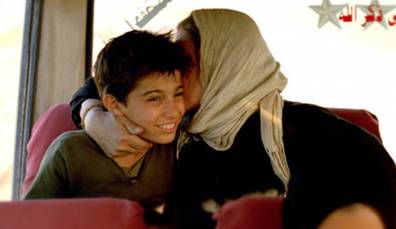
GIRALDILLO DE PLATA SECCIÓN OFICIAL:
BLACK FIELD de Vardis Marinakis (Grecia)

La cinta, procedente de la cinematografía griega, está ambientada a mediados del siglo XV cuando el yugo del imperio otomano se cierne con fuerza sobre Grecia. La congregación de un alejado convento rompe su rutina cuando un soldado jenízaro llega gravemente herido y las monjas se encomiendan a su cuidado. Los acontecimientos darán un giro inesperado cuando el soldado se enamora de Anthi, la novicia que cura sus heridas.
Una historia en la que se han enlazado temas que incluyen la mitología, la iconografía cristiana, la historia, la psicología, la sexualidad y la fantasía, y a partir de ellos se ha creado nada menos que una definición más amplia del amor... una muestra de las formas de superar los prejuicios y aceptar la realidad de los verdaderos sentimientos de cada uno.
Con esta película, Marikanis, nacido en Atenas y formado cinematográficamente en Londres, ha elegido un periodo histórico, escasamente conocido, y eso juega a favor de la cinta. Los actores protagonistas están bien, tanto Sofía Georgovassilli (Mavro Livadi) como Christos Passalis (Canino), y la historia juega con la ambigüedad sexual y asuntos que parecen pensados ahora y ambientados en el pasado. Hay una cuidada fotografía, premiada por la Academia de Cine de Grecia. Su director, de entrada, la ve como minoritaria y no como una película del gran público.
PREMIO ESPECIAL DEL JURADO:
TENDER SON de Kornél Mundruczó (Hungría, Alemania, Austria)
PREMIO MEJOR DIRECTOR DE FOTOGRAFÍA (Mátyás Erdély )
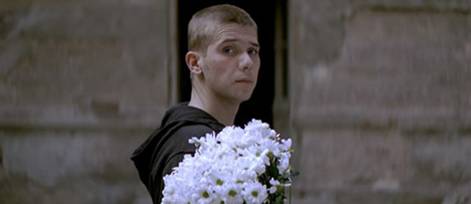
Desde luego se trata de una película atrevida y original, que explora con habilidad las fronteras entre el bien y el mal, además de considerar nuestra relación con la violencia y la responsabilidad.
Una película cuyo poder deriva de unas imágenes inquietantes. La sensación que transmite es de una obra fría, tanto por las localizaciones como por el interior prácticamente congelado de los personajes, totalmente inexpresivos e incapaces en su interior de generar algún sentimiento, menos aun de expresarlos si no es a través de movimientos torpes e impulsivos que conllevan aterradoras consecuencias.
Con una fotografía destacable cuando nos muestra los interiores del vetusto edificio donde hijo y madre se reencuentran o cuando nos relata el viaje de padre e hijo a través de paisajes nevados, el trabajo de Mátyás Erdély ha sido reconocido con el premio al Mejor Director de fotografía
Esta proyección, también galardonada con un discutible premio especial del Jurado, se caracteriza por ser un poco inaccesible. Una película en la que el excesivamente lento desarrollo de los acontecimientos puede posibilitar la pérdida de atención del espectador, aunque bien rodada, su ritmo predispone a entretenerse en las imágenes.
Mundruczó ha insistido en que no quiere bombardear el cerebro y que el espacio tiene una importancia fundamental para él. La nieve es el telón de fondo, durante gran parte de la película, con un efecto hipnótico que le sienta bien a esta película húngara.
PREMIO A LA MEJOR DIRECCIÓN y PREMIO AL MEJOR GUIÓN:
EN UN MUNDO MEJOR (IN A BETTER WORLD) de Susanne Bier (Dinamarca)

Susanne Bier (Después de la boda, El amor de mi vida) ha conseguido el premio al mejor Guión junto a Ander Thomas Jensen (Después de la boda) por una elaborada historia sobre la violencia y la venganza que plantea numerosos interrogantes en el espectador.
Esta dramática proyección, que mezcla dos mundos diferentes y se caracteriza por la gran interpretación de sus personajes, también ha recibido el premio a la mejor Dirección.
Seleccionada para representar a Dinamarca en los Oscar, como mejor película de habla no inglesa.
Bier nos sorprende en esta ocasión, contando la vida de dos familias que se cruzan cuando comienza una peligrosa amistad entre sus hijos de diez años. A lo largo de la proyección, se alternan dos mundos diferentes: Dinamarca y un campo de refugiados situado en África. De esta manera, se nos plantea la idea de si nuestra “avanzada” cultura es de verdad el modelo para un mundo mejor.
Mikael Persbrandt, galardonado con el Guldbaggen por Momentos inolvidables, de Jan Troell; Trine Dyrholm, actriz de títulos como En China comen perros y En tus manos, y Ulrich Thomsen, galardonado por Hermanos con la Concha de Oro en el Festival de San Sebastián, se sumergen con una gran interpretación en este metraje que explora las limitaciones con las que nos encontramos al intentar controlar la sociedad y nuestras vidas personales.
Bier ha explicado que desea que su público se haga preguntas al ver En un mundo mejor, “el público tiene una doble tarea: pasárselo bien y responder a esas cuestiones".
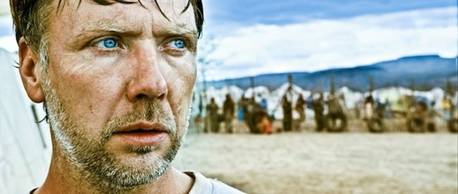
MENCIÓN ESPECIAL: JOY de Mijke de Jong (Holanda)
PREMIO MEJOR ACTRIZ: Samira Maas

La realizadora holandesa vuelve al Festival, dos años después de ganar el Giraldillo de Plata por La hermana de Katia, con esta película que narra la historia de una chica a la que su madre abandonó nada más nacer y que piensa que sólo será feliz cuando se reúna con ella. Para reflejar todo el aislamiento de la actriz principal (Premio a Mejor Actriz por la correcta interpretación de la joven holandesa Samira Maas) , la directora holandesa hace uso de un color saturado, con el que ha querido realzar “la fortaleza de Joy, hacerla más viva y darle más realismo”.
En este sentido, la directora artística Jolein Eline Laarman Adt, ha explicado que se han buscado localizaciones que potencian esta soledad y aunque en el guión Joy “vivía en un ático mucho más bonito se prefirió elegir un edificio de oficinas”, también visitaron muchos orfanatos y centros de acogida reales para captar la realidad del personaje.
Como puede verse, una trama argumental que no aporta nada nuevo. Al menos, Jong no ha estirado la cinta más de lo debido. Lo mejor, el mensaje que transmite, la importancia de la comunicación y que la fuerza debemos encontrarla en nosotros mismos y no en los demás.
Joy es la tercera parte de una trilogía acerca de tres chicas a punto de hacerse adultas. La hermana de Katia, antes comentada, y Bluebird completan esta saga sobre “la vulnerabilidad de las mujeres”. Jong ha explicado que Joy es una película “acerca de la soledad y el amor, sobre cómo se vive cuando se abre el corazón y qué ocurre cuando se cierra”. También ha insistido en que “Joyes un personaje con un escudo impenetrable que observa que todos los que le rodean tienen lo que ella desea, no ha tenido más remedio que desarrollar un caparazón, un escudo, con el que proteger su corazón”.
Por tanto, al igual que en los dos títulos anteriores de la trilogía, la cinta habla del mecanismo de defensa que la directora encuentra en todas las mujeres y, aunque los personajes de las tres sean completamente distintos, todas ellas reflejan“cómo se vive cuando se actúa con amor y qué ocurre cuando se cierra el corazón al exterior”, ha definido la directora.
Así, el mensaje principal de la película para De Jong, que muestra siempre un enorme interés por los asuntos sociales, es “la necesidad de comunicarnos en la vida y qué ocurre si no se tiene esta comunicación”.

GRAN PREMIO DEL PÚBLICO :
TAMARA DREWE de Stephen Frears (Reino Unido)

La maestría del realizador británico Stephen Frears no es ya ninguna incógnita para nadie. Desde aquella lejana The Hit (La venganza), filmada en Sevilla en el año 1984 con actores de la talla de John Hurt, Terrence Stamp o Fernando Rey (podrá verse en esta edición del Festival), hasta la muy reciente The Queen, que le valió a Helen Mirren su primer Oscar, pasando por cintas inolvidables como Mi hermosa lavandería, Café irlandés, Las amistades peligrosas o Alta fidelidad; dan buena cuenta del talento de un cineasta que ha sabido conjugar a la perfección el crudo realismo británico con ciertas dosis de originalidad algo excéntrica.
Su nueva película, Tamara Drewe, se inscribe en una última tendencia en su carrera basada en la liviandad de sus planteamientos, como ya hiciera en Mrs. Henderson presenta o Cheri, en esta ocasión como excusa para desatar toda su socarronería algo malévola en una comedia que nos traslada a la apacible campiña inglesa. Allí, en un bonito paraje compuesto de extensos campos verdes y granjas esparcidas por sus laderas, encontramos una casa-hostal donde se dan cita algunos escritores (o aspirantes a serlo) en busca del sosiego que la ciudad les roba, sobre los que destaca el exitoso dueño de la propiedad, un autor de best-sellers un tanto embustero y muy dependiente de su abnegada esposa.
Pero la tranquilidad que todos parecen disfrutar se quebrará de pronto cuando una atractiva muchacha, Tamara Drewe, regresa a su pueblo natal y desboca sentimientos y deseos en muchos de los habitantes de la zona, con consecuencias impredecibles. La película de Frears narra una amalgama de situaciones rocambolescas protagonizadas por una multitud de personajes que se influyen mutuamente y desencadenan reacciones que no hacen más que complicar el embrollo monumental en el que todos se encuentran inmersos.
El humor británico es siempre bienvenido, aunque sea negro, especialmente porque supone un contrapunto necesario a la comicidad exagerada de sus primos norteamericanos. Se suscita la risa con situaciones que bien podrían llevar al llanto o, cuando menos, a la preocupación más absoluta. Sin embargo, el público disfruta, de forma un poco cruel, de los continuos infortunios que los protagonistas sufren. Y, de hecho, ahí se encuentra la agudeza. Frears, en su nueva película, la alcanza con suma facilidad, aunque en algunas ocasiones se perciba una cierta desorientación en el desarrollo de la trama.
Por otro lado, Frears no duda en recurrir a una de las actrices más en boga de la actualidad, Gemma Arterton, vista recientemente en Prince of Persia y Furia de Titanes, así como en toda una terna de actores británicos no muy conocidos pero con una cualidad pasmosa para provocar la risa; Roger Allam como el mujeriego escritor de best sellers, Luke Evans como el agricultor paciente, Dominic Cooper como la estrella de rock o la excelente Tamsin Greig, interpretando a la esposa entregada y engañada. Mención aparte merecen las dos adolescentes ( una de ellas la prometedora hija del director) con cuyo desparpajo originan todo el lío en el que deviene la trama.
Tamara Drewe es una entretenida comedia que hace pasar un buen rato, aunque su final demasiado negro y su duración excesiva reste un poco de valor al conjunto.
The aviatrix of Kazbek, de Ineke Smits
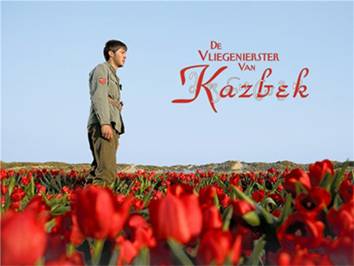
The aviatrix of Kazbek, de Ineke Smits, ha sido la elegida para presentar la sección "Wild Tulips", con la cual el Festival ha rendido homenaje al cine holandés. En esta ocasión, Smits nos traslada a un episodio de la Segunda Guerra Mundial en Holanda. Un regimiento de soldados georgianos acude a la Isla de Texel, en donde una familia de granjeros los debe albergar. La única hija de esta familia, Marie, queda fascinada ante su llegada.
Un cine arriesgado, versátil y con una fuerte carga visual. Así han definido su cine los directores, productores y actrices holandeses que están en Sevilla con motivo de la selección que el festival de cine dedica a la filmografía de este país, "un cine que cada vez tiene más presencia a nivel internacional gracias a reconocimientos como éste", celebró Ineke Smits, directora de La aviadora de Kazbek.
La propia directora asegura que no pretende ser otra película bélica, "que ya hay muchas y muy buenas" sino reflejar, a través de la mirada de su protagonista, la debutante Madelief Blanken, "la nostalgia del hogar de los soldados georgianos" y, más allá, hacer ver "cómo la imaginación nos ayuda a salvarnos de la dura realidad".
Una curiosa película, este drama con pinceladas de comedia y musical, de cuidada fotografía y una narración interesante. Marie nos muestra un trágico episodio desde su particular perspectiva, soñadora e imaginativa, dándole un atisbo esperanzador. De esta manera, Smits ha conseguido su objetivo, "contar cómo en los momentos difíciles se utiliza la imaginación para superar la vida real".
The happy housewife, de Beumer (Holanda)

The happy housewife, de la holandesa Beumer (See you in Vegas) está basada en la novela homónima de Heleen van Roye. Esta película cuenta la historia de Lea, una atractiva y feliz azafata casada con un profesional de éxito. Cuando dan a luz a su primer hijo, tras un traumático parto, la mujer comienza a sumergirse en una depresión que la va alejando de la realidad. Su objetivo será volver a su vida anterior, donde sólo están ellos dos.
Carice van Houten (Red de mentiras, Valkiria, El libro negro) y Waldemar Torenstra (Bride flight, Zomerhitte) protagonizan esta interesante adaptación que ha contado con un gran éxito de público en Holanda y es presentada por primera vez fuera del país.
Destaca la complejidad del personaje de Lea que, conforme se desarrolla el guión, va siendo consciente de la ausencia de algo, pero también su belleza y su chispa en los diálogos a veces desternillantes que mantiene a lo largo de la obra. Van Houten ha explicado que la película es "una historia real" y que para preparar el personaje tuvo que hablar con el escritor de la novela y con muchas mujeres que habían dado a luz.
En esta historia trágica con ciertas pinceladas de humor, Beumer intenta explicar cómo una vida perfecta se puede desmoronar en un momento, "es un guión con una temática trágica pero con un tratamiento ligero". El productor de la cinta, Hans de Weers (Cazadores de mentes, Alejandro Magno) ha señalado la gran importancia de la música, que, "si no es el 50%, es gran parte de la película"
.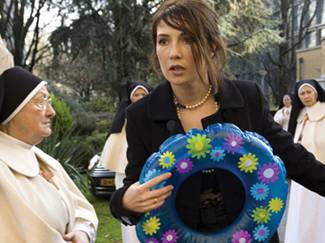
PREMIO MEJOR ACTOR:
Rhys Ifansen Mr. Nice, de Bernard Rose

Mr. Nice es una película que destaca, ante todo, por el reconocido y diverso reparto de intérpretes que posee: Rhys Ifans, Chloë Sevigny y David Thewlis junto a los nacionales Luis Tosar y Elsa Pataki. Todos ellos se han sumergido de lleno en un guión, quizás con una excesiva duración, pero que consigue describir, detalladamente, 35 años de la vida de Marks y su paso por 12 países diferentes. El relato tiene momentos vivos y sorprendentes, pero a la larga se hace lento y repetitivo, como si en el proceso de montaje hubiese cundido el miedo a eliminar demasiada película y que no llegara el mensaje que envuelve la vida del protagonista.
El premio al mejor Actor ha sido para Rhys Ifans (Notting Hill, Human nature). El reconocido actor inglés realiza una muy buena interpretación del traficante de estupefacientes Howard Marks. Es curioso observar cómo el personaje aparece siempre con la misma apariencia a pesar de que la película describa 35 años de su vida. Bernard Rose (The Kreutzer Sonata, Amor inmortal), el director, ha explicado que los toxicómanos a veces se quedan atrapados en la juventud, "siempre se ven de la misma manera".
La película parece ser un alegato a favor de la legalización de las drogas blandas a fin de acabar con el indeseable comercio ilegal e internacional. Incluso tienta al espectador a pensar que el protagonista no es mas que una víctima del viciado sistema.
Essential Killing de Jerzy Skolimowski (Polonia)

Jerzy Skolimowski no tiene ninguna intención de ser convencional y tampoco tiene ningún problema en reconocerlo. Por eso, en la presentación de ‘Essential Killing’, su última propuesta cinematográfica, que clausuró el Sevilla Festival de Cine Europeo y que se pudo ver por primera vez en nuestro país, ha reconocido que su película “tiene la intención de ser lo más ambigua posible”.
En realidad, la cinta, aclamada a nivel mundial tanto por su temática como por su arriesgado rodaje, habla de la escapada de un prisionero talibán de las cárceles de la CIA en Polonia. Pero, más allá de hacer un documental o plantear debates políticos, lo que realmente le interesaba a Skolimowski, según ha comentado en la rueda de prensa, era “contar la historia de un hombre que es un ser humano y que se tiene que convertir en un animal salvaje, obligado a matar para sobrevivir”, ha puntualizado.
Así, ‘Essential Killing’ es, tal y como ha definido el director polaco en más de una ocasión, una fantasía dramática sobre el instinto de supervivencia. Un concepto que, por otro lado, encarna a la perfección su actor principal Vincent Gallo que, según el director, consigue comunicar la intensidad animal que buscaba para el personaje y que recibió la Copa Volpi del Festival de Venecia por su actuación, de gran esfuerzo físico, que ocupa prácticamente cada plano de la cinta.
También es especialmente interesante el peso que el autor le concede a los paisajes y a lo visual en la película, sin apenas diálogos y con una potente banda sonora. Esto se debe, según ha explicado el propio Skolimowski, a su sentido de la estética. “Evito la fealdad”, ha asegurado, “hasta el punto de que no puedo dejar un marco feo en mi película”, concluye.
Pero, además, es una propuesta arriesgada por su rodaje, llevado a cabo en condiciones tremendamente difíciles. De hecho, como ha explicado hoy el veterano creador, “la mayoría de las escenas se tuvieron que grabar de noche y a muy bajas temperaturas, en muchos casos rozando los 35 grados bajo cero”.
En suma un excelente trabajo de Skolimowski, con una fotografía excelente que nos traslada desde el desierto afgano hasta los bosques helados de no se sabe dónde, ni falta que hace, mientras nos muestra con una relativa dosis de crudeza la transformación sucesiva de un hombre en su huida hacia la supervivencia.

Para finalizar nuestra crónica, dejamos aquí el palmarés que, como en todo festival que se precie, ha conllevado cierto grado de disconformidad entre público, prensa y jurado.
Palmarés Oficial SEFF 2010
GIRALDILLO DE ORO SECCIÓN OFICIAL :
SON OF BABYLON de Mohamed Al-Daradji (Irak, Reino Unido, Holanda, Francia, Emiratos Árabes, Egipto, Palestina)
GIRALDILLO DE PLATA SECCIÓN OFICIAL :
BLACK FIELD de Vardis Marinakis (Grecia)
PREMIO ESPECIAL DEL JURADO :
TENDER SON de Kornél Mundruczó (Hungría, Alemania, Austria)
PREMIO A LA MEJOR DIRECCIÓN :
EN UN MUNDO MEJOR (IN A BETTER WORLD) de Susanne Bier (Dinamarca)
PREMIO A LA MEJOR ACTRIZ :
(Ex aequo) SAMIRA MAAS por JOY (Holanda) y SOFIA GEORGOVASSILI por BLACK FIELD (Grecia)
PREMIO AL MEJOR ACTOR :
RHYS IFANS por MR. NICE (Reino Unido, España)
PREMIO AL MEJOR GUIÓN :
EN UN MUNDO MEJOR (IN A BETTER WORLD) de Susanne Bier y Anders Thomas Jensen (Dinamarca).
PREMIO AL MEJOR DIRECTOR DE FOTOGRAFÍA :
MÁTYÁS ERDÉLY por TENDER SON (Hungría, Alemania, Austria)
MENCIÓN ESPECIAL :
JOY de Mijke de Jong (Holanda) y NAUFRAGIO de Pedro Aguilera (España)
GIRALDILLO DE ORO A LA MEJOR PELÍCULA DOCUMENTAL :
ÚLTIMO CAPÍTULO: ADIÓS NICARAGUA / LAST CHAPTER: GOODBYE NICARAGUA de Peter Torbiörnsson (Suecia, España)
MENCIÓN ESPECIAL :
FAREWELL de Ditteke Mensink (Holanda)
PREMIO EURIMAGES :
LA PRIMA LINEA de Renato De María (Italia, Belgica)
GRAN PREMIO DEL PÚBLICO :
TAMARA DREWE de Stephen Frears (Reino Unido)
GIRALDILLO DE PLATA A LA MEJOR DIRECCIÓN DE PRIMER LARGOMETRAJE (First Films First) :
GIGOLA de Laure Charpentier (Francia)
PREMIO JURADO CAMPUS :
SON OF BABYLON de Mohamed Al-Daradji (Irak, Reino Unido, Holanda, Francia, Emiratos Árabes, Egipto, Palestina)
El Premio ASECAN (Asociación de Escritores Cinematográficos de Andalucía):
SILENT SOULS de Aleksei Fedorchenko (Rusia)
Premio de honor internacional:
Stephen Frears
Premio homenaje SEFF:
Joris Ivens y Marceline Loridan-Ivens
Premio de honor a toda su carrera:
Vicente Aranda
Premio de la industria SEFF/SILE 2010:
Claudia Landsberger
Premio Ciudad de Sevilla:
Carlos Saura
Premio RTVA a la trayectoria profesional:
Antonio Banderas
|
|
Desde Sevilla – España a 20 de Noviembre de 2010
Miguel Jiménez-El Taller de Zenon
SEVILLA FESTIVAL DE CINE EUROPEO 2010
MIGUEL JIMENEZ-EL TALLER DE ZENON.
In the days before the beginning of the Festival (5-13 November) its director, Martín-Domínguez, disclosed us a general idea of the Festival itself:
“El SEFF’10- that has been allocated this year with a budget of €1.7 million- intends to be an active Festival, updated, colourful and welcoming, which continues consolidating its public presence in the media, which has grown a 60 percent in the last two years and in which there will be a most numerous presence of Spanish films”
For this SEFF’10, the organization has maintained its habitual structure, that is, the sections (the official one and the documentary), plus the total of films selected for the European Academy (EFA) and the financed films jointly with the European Fund EURIMAGES; but it has included some interesting novelties such as the award for novel directors, section “First Films First” and the celebration of the 20th anniversary of channel ARTE with the projection of films with the participation of the French-German.
For somebody unaware of this, the most surprising thing can be precisely the number of sections in which the movies are divided into. 26 categories to classify more than 150 films, an excess along with the morning press passes, where actors, directors and else must fight against sleep and answer the questions at 9 am, or the enormous number of conferences, presentations and speeches about the world of cinema.
And however, the organization achieves to get closer or the regular citizens, not only for the number of movies and genres, but because of the amount of days it lasts and the really inexpensive prices, so the students, always faithful, show themselves enthused and they answer by filling the theaters and together with the incomprehensible habit of barely publicizing the Festival.As well as in former editions we wonder the cause of such idea that makes that in some parts of the city nobody knows that an excellent Film Festival is being held, when the city should be inundated by posters that provide information to both experts and visitors of its existence and guide them to their venues.
From the overwhelming offer of the Festival we highlight the official section, obviously, devoted to three great directors, this year paying tribute to Frears, Vicente ArandaandManoel De Oliveira, the celebration of the Dutch cinema (Wild Tulips, with 13 awards) and the EFA selection (from the pre-nominated ones by the European Film Academy, some of which already known by the London Film Festival).
But let’s begin with the awards this year and analyse some films, interestin in our humble opinión, which have been awarded or not. We also disclose the feeling of a better quality in general in all works presented and a greater diversity in the genres, especially in relation with former editions in which some irregular works were found and a deeper monotony (dullness) in the scripts.
GOLDEN GIRALDILLO OFFICIAL SECTION and CAMPUS JURY AWARD:
SON OF BABYLON by Mohamed Al-Daradji (Iraq, United Kingdom, Holland, France, Arab Emirates, Egypt, Palestine)
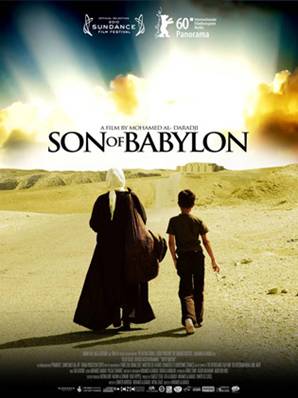
This is truly an exceptional movie, with a high level of performance and photography to name a few aspects of the film. Film already awarded at Sundance, it is produced through a road movie structure. The film tells how three years after the fall of Saddam Hussein, Ahmed, a Kurdish boy aged 12, travels the roads of northern Iraq with his grandmother. Both search for the boy's father, a soldier arrested by Saddam's Republican Guard at the end of the Gulf War. In their search they travel devastated paths by bombs and interact with others in the same situation, all travel in search for someone, a new life and a future.
Following the trail of Ibrahim, the main characters experience all kinds of situations, and the viewer will soon join their pain.
And the film is hard, very hard. The film deepens into the suffering of the Iraqi people before and after the defeat of Saddam. The desolate landscape is consistent with the cities destroyed, and the lack of people in the fields without vegetation contrasts with the crowding at the points of departure and arrival of refugees, or people who go out looking for missing relatives. They will do that in buses which have had already nine lives and meet American controls while they sight in the distance the fire of destruction.
Al Daradji films in Iraq itself and uses non-actors,which highlights the performance of the main characters. The excitement in the interpretation cannot be more real: the actress who portrays the grandmother suffered herself the disappearance of a relative. Meanwhile, the child Ahmed seems to have been acting all his life. The register changes, from despair when looking for his father, to the joy when he learns that they will pass near the Hanging Gardens of Babylon, and even have the chance to see them, it is a prodigy .
Some director’s statements in the press conference later can help us to understand some aspects of the film:
"When I decided to film the story of the hundreds of missing ones, buried in mass graves during the war in Iraq, it was clearly going to be difficult. On the one hand, because Ahmed, the boy who starred in the film, it was myself "and, secondly, because" filming in Iraq is a nightmare. "
"One day, walking through the streets of Baghdad, I heard on the radio that they had discovered mass graves and I thought about my aunt because she had lost her son in the war of Iran and Iraq," he commented.
To find this grandmother who is not resigned to losing his son, he visited many villages in Iraq. "In his village I visited about 25 houses and all the women that I met told me stories of this kind and they would mourn," told the director, "but she did not cry, though she had sadness in her eyes, and Then I knew she could star in my film, "he says.Moreover, the protagonist, also had her husband gone for 22 years, she had been in prison and even lost a baby there, "the only way to convince her was to say that through the film she may find her husband."
This difficulty accompanied by the fact that production in Iraq is "crazy" and, as has the director of this film had confessed, since he began filming in 2008 "I had to stop filming several times because of the lack of money" , hence the need to look forexternal support.
By traveling Iraq he also found the protagonist child, "a very smart child who bribed me many times," joked the artist, added thathe "had to be all the time accepting his blackmail, give gifts, play football with him, etc. ", otherwise the child got angry with me and "translated wrong what I said to her mother, who speaks Kurdish, for her to get angry with me" told with a friendly tone.
"I try to tell people that Iraq is a beautiful country that the war, dictatorships and the U.S. invasion have destroyed." Therefore, he makes use of "black humor that characterizes Iraqis" and emphasizes the cultural values of a country "that continues the legacy of Babylon," he highlighted.
Also, the commitment to what is happening around the movie does not end with it. Mohamed Al-Daradji has founded the campaign "The missing in Iraq ', with which it has called the Iraqi government, UN, European Union and, finally, to all international institutions to assist in the search for disappeared people into mass graves.

SILVER GIRALDILLO OFFICIAL SECTION:
BLACK FIELD by Vardis Marinakis (Greece)
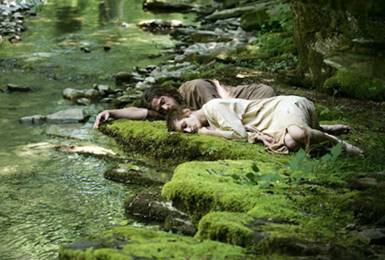
The film, from the Greek film industry, is set in the mid-fifteenth century when the Ottoman oppressionlurks upon Greece. The congregation of a remote monastery breaks its routine when a Janissary soldier gets seriously injured and the nuns are entrusted to his care. The events will provide an unexpected twist when the soldier falls in love with Anthi, the novice who heals his wounds ..
A story that has been linked subjects including mythology, Christian iconography, history, psychology, sexuality and fantasy, and from them it has been created nothing less than a broader definition of love ... A sample of the ways to overcome prejudices and accept the reality of the true feelings of each individual.
With this film, Marikanis, born in Athens and with a film experience in London, has chosen a historical period, scarcely known, and that benefits the film. The main actors are good, both Georgovassilli Sofia (MavroLivadi) and Christos Passalis (Canino), and the story plays with sexual ambiguity and issues that seem designed now and set in the past. There is a stunning photography, awarded by the Film Academy in Greece. Its director, basically, considers it as a minority and not as an audience film.
SPECIAL JURY PRIZE:TENDER SON by Kornél Mundruczó (Hungary, Germany, Austria)
BEST DIRECTOR OF PHOTOGRAPHY AWARD(Mátyás Erdély)
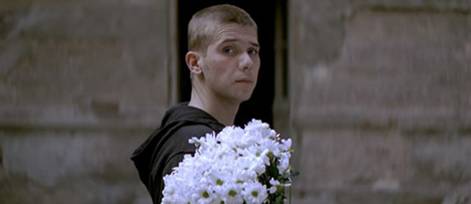
Of course this is a bold and original film that deftly explores the boundaries between good and evil, and considers our relationship with violence and responsibility.
A movie whose power derives from disturbing images. The feeling conveyed is of a cold work, both because of locations and because of the virtually frozen inner part of the characters, completely expressionless and incapable inside to generate any feelings, let alone to express them if not through clumsy and impulsive movements that provoke terrifying consequences.
With a remarkable photography showing us the insides of the old building where mother and son are reunited or when it narrates the father and son’s journey through snowy landscapes, MátyásErdély’s work has been recognized with the award for Best Director of Photography.
This projection, also awarded with a Special Jury Prize controversially, it is characterized by being a bit inaccessible. A film in which the excessively slow development of events can allow the loss of viewer's attention, although well shot, its entertaining pace predisposes the focusing in the images.
Mundruczó has insisted that he wants to bomb the brain and that the space has a fundamental importance for him. Snow is the background for a good part of the film, with a hypnotic effect that suits this Hungarian film.
BEST DIRECTION and BEST SCRIPT AWARD: IN A BETTER WORLD by Susanne Bier (Denmark)
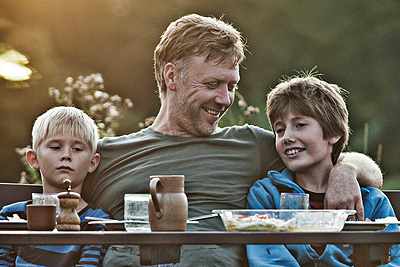
Susanne Bier (After the Wedding, The Love of my Life) has won the award for best screenplay with Anders Thomas Jensen (After the Wedding) thanks to an elaborated story about violence and vengeance that has raised many questions in the viewer.
This dramatic projection, which combines two different worlds and is characterized by the great performance of itscharacters, has also received the award for Best Director.
It has been selected to represent Denmark in the Oscar as Best Foreign Language film.
Bier surprises us this time, telling the story of two families that meet when a dangerous friendship between the two children aged tenbegins. Throughout the screening, two different worlds alternate: Denmark and a refugee camp in Africa. Thus, we face the idea of whether our "advanced" culture is really the model for a better world.
Mikael Persbrandt, awardedwith the Guldbaggefor Unforgettable Momentsby Jan Troell;Trine Dyrholm, actress in In China They Eat Dogs and In your Hands, and Ulrich Thomsen, awarded with aGolden Shell at San Sebastian Film Festival for Brothersin which they have deepened with a great performance in this footage that explores the limitations found with which we are trying to control society and our personal lives.
Bier explained that he wishes his audience to ask themselves questions when they watch In a Better World, "the audience has a double task: to have fun and to answer those questions."
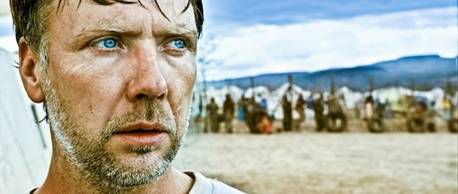
SPECIAL MENTION: JOY de Mijke de Jong (Holland)
BEST ACTRESS AWARD: Samira Maas

The Dutch filmmaker returns to the Festival, two years after winning the Silver Giraldillothanks to Katia's Sister, with this film that tells the story of a girl whose mother left at birth and who thinks she will only be happy when she meets her. To reflect the total isolation of the main actress (Best Actress Award for the excellent interpretation of the Dutch girl Samira Maas), the Dutch director makes use of saturated color, with whichshe wanted to enhance "the strength of Joy, make it brighter and provide it with more realism."
In this sense, the artistic director JoleinElineAdtLaarman, explained that they searched for locations that enhanced the solitude and although the script of Joy "lived in a much nicer attic it waschoosen an office building”, they also visited many orphanages and shelters to capture actual reality of the character.
As one can see, a plot that brings nothing new. At least, Jong’s film has not been stretched more than it should have. The best, the message it conveys, the importance of communication and the strength we find in ourselves and not in others.
Joy is the third part of a trilogy about three women about to become adults. Katia's Sister, described before, and Bluebird complete this series on "the vulnerability of women." Jong explained that Joy is a film about loneliness and love, about life when you open your heart and what happens when it closes. " She has also insisted that "Joy is a character with an impenetrable shield that is aware that everybodyhas what she wants, she has had no choice but to develop a shell, a shield, which protectsher heart."
Therefore, as in the two previous titles in the trilogy, the film deals with the defense mechanism that the director finds in all women and, although the three characters are completely different, they all reflect "how to live, when to act with love and what happens when the heart is closed to the outside ", defined the director.
Thus, the main message of the film according to De Jong, who always shows great interest in social issues, is "the need to communicate in life and what happens if you do not have this communication."

AUDIENCE CHOICE AWARD:
TAMARA DREWE by Stephen Frears (United Kingdom)

The mastery of British director Stephen Frears is no longer any mystery to anyone.Since that distant The Hit (Revenge), filmed in Seville in 1984 with actors like John Hurt, Terence Stamp and Fernando Rey (it can be seen at this year's Festival) to the most recent The Queen, thanks to which Helen Mirren got her first Oscar, through unforgettable films such as My Beautiful Laundrette, The Snapper, Dangerous Liaisons and High Fidelity, give a good account of the talent of a filmmaker who has managed to combine perfectly the harsh reality with some elements of British originality somehow eccentric.
His new film, Tamara Drewe, is part of a recent trend in his career based on the lightness of his approach, as he did in Mrs. Henderson Presents or Chéri, on this occasion as an excuse to unleash all his cunning somehow evil in a comedy that takes us to the quiet English countryside. There, in a beautiful setting composed of extensive green fields and farms scattered across the slopes, we found a guest house which brings together some writers (or amateurs) to find the peace stolen in the cities, in which successful ownerstands, an author of best-sellers who is a little liar and very dependent on his devoted wife.
But the peace that everyone seems to enjoy is suddenly broken when an attractive girl, Tamara Drewe, returns to her hometown and provokes feelings and desires in many of the locals, with unpredictable consequences. Frears's film tells a bizarre amalgam of situations featuring a multitude of characters who influence one another and trigger reactions that only complicate the huge mess in which all are immersed.
British humor is always welcome, even black, especially because it involves a necessary counterpoint to the exaggerated comedy of their North American cousins.This makes us laugh with situations that could well lead to tears or at least, to the utmost concern. However, the audience enjoys, in a bit cruel manner, the continuing mishaps that the characters suffer. And indeed, there is the sharpness. Frears, in his new film, achievesit with ease, although sometimes some confusionis perceived in the plot development.
On the other hand, Frears does not hesitate to use one of the most fashionable actresses today, Gemma Arterton, recently seen in Prince of Persia and Clash of the Titans, as well as in a group of British actors not well known but with an amazing quality to provoke laughter, Roger Allam as the womanizing writer of best sellers, Luke Evans as the patient farmer, Dominic Cooper as the rock star or the excellent TamsinGreig, playing the devoted and deceived wife.Special mention for two teenagers (one of them the promising daughter of the director) in whose naturality lies all the events that lead to the plot.
Tamara Drewe is an entertaining comedy that makes us have a good time, although its too black end and excessive length minimize some value to the whole.
The Aviatrix of Kazbek, byIneke Smits
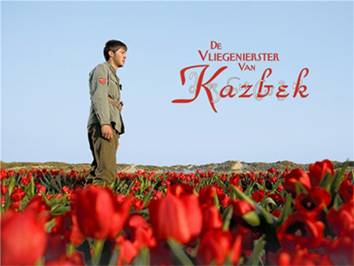
The Aviatrix of Kazbek, byIneke Smits, has been chosen to represent the "Wild Tulips" section with which the Festival has paid tribute to the Dutch cinema. This time, Smits takes us to an episode of World War II in Holland. A regiment of Georgian soldiers go to the island of Texel, where a family of farmers is accommodated. The only daughter of this family, Marie, is fascinated by their arrival.
Extreme cinema, versatile and with a strong visual load. Thushis filmolgraphyhas been defined by Dutch directors, producers and actresses who are in Seville because of the section that the Festival has devoted to their country, "a film that is increasingly becoming international thanks to tributeslike this "saidIneke Smits, director of The Aviator Kazbek.
The director herself states that she has not intended to produce another war movie, "there are already many and very good" but to reflect, through the eyes of its protagonist, the debutante MadeliefBlanken, "the nostalgia of the homeof Georgian troops" and also, to see "how imagination helps us to save us from the hard reality."
A curious movie, this drama with touches of comedy and musical, stunning photography and interesting narrative. Marie shows us a tragic episode from their particular perspective, dreamy and imaginative, providing it of a glimmer of hope. Thus, Smits has achieved her goal, "telling how during difficult times imagination is used to overcome real life.
The Happy Housewife, byBeumer (Holland)
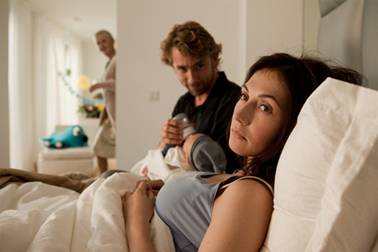
The Happy Housewife, the by Dutch Beumer (See you in Vegas) is based on the novel by Heleen van Roye. This film tells the story of Leah, an attractive hostess and happily married to a successful professional. When giving birth to her first child after a traumatic childbirth, the woman starts to sink into a depression that moves her away from reality. Hergoal will be to return to her previous life, where there were just the two of them.
Carice van Houten (Body of Lies, Valkyrie, Black Book) and WaldemarTorenstra (Bride Flight, Zomerhitte) star in this exciting adaptation has had a great audience success in Holland and it is presented for the first time outside the country.
It is very remarkable the complexity of the character of Leawho, as the script develops, will be aware of the absence of something, but also her beauty and spark in the sometimes hilarious dialogues that she has throughout the work. Van Houten explained that the film is "a true story" and to prepare the character she had to speak with the writer of the novel and women who had given birth.
In this tragic story with some touches of humor, Beumer tries to explain how a perfect life can fall apart in a moment, "it is a screenplay with a tragic topic but with a light approach”. The producer of the film, Hans de Weers (Mindhunters, Alexander the Great) has pointed out the great importance of music, that "if not 50%, it is the majority of the movie"
.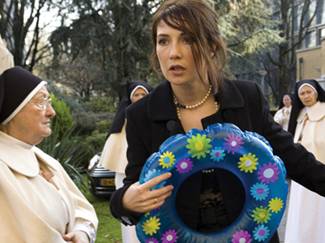
BEST ACTOR AWARD:
Rhys Ifansin Mr. Nice, by Bernard Rose.

Mr. Nice is a film that stands out above all by the renowned and diverse cast of actors which it has: Rhys Ifans, Chloe Sevigny and David Thewlis nationals with Luis Tosar and Elsa Pataki. All of them have been submerged into a script, with an excessive length perhaps, but it achieves to describe 35 years in the life of Marks and his journeys through 12 different countries. The narrative has vivid and surprising moments, but eventually it becomes slow, and repetitive, as in if the assembly process they had succumbed to the fear ofeliminating too much movie and not conveying the message that surrounds the protagonist's life.
The Best Actor Award has gone to Rhys Ifans (Notting Hill,Human Nature). The renowned British actor makes a very good interpretation of the drug dealer Howard Marks. It is curious to observe how the character appears with the same appearance even though the film describes 35 years of his life. Bernard Rose (The Kreutzer Sonata, Immortal Beloved), the director, explained that drug addicts sometimes get caught up in youth, "always look the same way."
The film seems to be a plea for the legalization of soft drugs in order to end the undesirable illegal and international trade. It even tempts the viewer to think that the main character is nothing but a victim of the foul system.
Essential Killing by Jerzy Skolimowski (Poland)
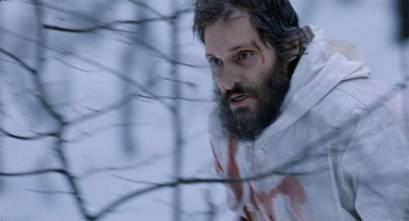
Jerzy Skolimowskihas no intention of being conventional and does not have any problem recognizing it. Therefore, in the presentation of 'Essential Killing', his latest film proposal, which closed the Sevilla European Film Festival and was seen for the first time in our country, has acknowledged that his film "is intended to be as ambiguous as possible”.
In fact, the film, worldwide acclaimed for both its subject as its risky filming, deals with the escape of Taliban prisoners from the CIA prisons in Poland. But beyond making a documentary or raising political debates, which really interested Skolimowski, as he commented at the press conference was "telling the story of a man who is a human being and he has to become a wild animal, forced to kill to survive, "he pointed out.
Thus, 'Essential Killing' is defined, according to the Polish director, in more than one occasion, as a fantasy drama about the survival instinct. A concept that, on the other hand, Vincent Gallothe main actorperfectly embodies, according to the director, he manages to communicate the animalintensity he was searching for the character and received the Volpi Cup at Venice for his performance, high physicaleffort, filling practically every level of the film.
Also it is especially interesting the weightthat the author gives to the landscapes and the images in the film, with little dialogue and a powerful soundtrack. This is because, as Skolimowskiexplained, of his sense of aesthetics. "I avoid the ugliness",he assured, "to the extent that I cannot leave an ugly part in my film",he concludes.
But it is also a risky proposition for his shooting, carried out in extremely difficult conditions. In fact, as the veteran designerexplained today, "most of the scenes had to be recorded at night and with very low temperatures, often reaching the 35 degrees below zero”.
In short, an excellent job of Skolimowski, with an excellent photography hichtakes us from the Afghan desert to the icy forests of nowhere, while showing us a relative dose of harshness, the successive transformation of a man in his flight for survival.
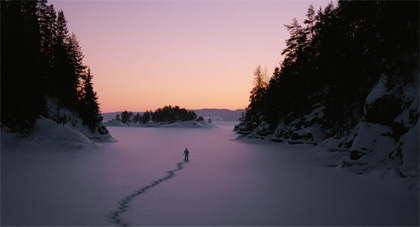
To complete our review, we leave the Official Awards, thatas in any festival worth its salt, has raised some controversy among the audience, press and jury.
Official Awards SEFF 2010
GOLDEN GIRALDILLO OFFICIAL SECTION: SON OF BABYLON by Mohamed Al-Daradji (Iraq, United Kingdom, Holland, France, UAE, Egypt, Palestine)
SILVER GIRALDILLO OFFICIAL SECTION: BLACK FIELD by VardisMarinakis (Greece)
SPECIAL JURY PRIZE: TENDER SON by KornélMundruczó (Hungary, Germany, Austria)
BEST DIRECTION AWARD: EN UN MUNDO MEJOR (IN A BETTER WORLD) by Susanne Bier (Denmark)
BEST ACTRESS AWARD: (Ex aequo) SAMIRA MAAS for JOY (Netherlands) and SOFIA GEORGOVASSILI for BLACK FIELD (Greece)
BEST ACTOR AWARD: RHYS IFANS for MR. NICE (United Kingdom,Spain)
BEST SCRIPT AWARD: EN UN MUNDO MEJOR (IN A BETTER WORLD) by Susanne Bier and Anders Thomas Jensen (Denmark).
BEST DIRECTOR OF PHOTOGRAPHY AWARD: MÁTYÁS ERDÉLY for TENDER SON (Hungary, Germany, Austria)
SPECIAL MENTION: JOY de Mijke by Jong (Netherlands) and NAUFRAGIO by Pedro Aguilera (Spain)
GOLDEN GIRALDILLO TO THE BEST DOCUMENTARY FILM: LAST CHAPTER: GOODBYE NICARAGUA by Peter Torbiörnsson (Sweden, Spain)
SPECIAL MENTION: FAREWELL by DittekeMensink (Netherlands)
EURIMAGES AWARD: THE FRONT LINE de Renato De María (Italy, Belgium)
AUDIENCE CHOICE AWARD: TAMARA DREWE by Stephen Frears (United Kingdom)
SILVER GIRALDILLO AWARD for Best Direction of a first feature film (First Films First): GIGOLA by Laure Charpentier (France)
CAMPUS JURY AWARD: SON OF BABYLON by Mohamed Al-Daradji (Iraq, United Kingdom, Holland, France, UAE, Egypt, Palestine)
ASECAN Award (Film Writers Association of Andalusia) : SILENT SOULS by AlekseiFedorchenko (Russia)
International Honorary Award: Stephen Frears
SEFF Tribute Award: JorisIvens and Marceline Loridan-Ivens
Tribute life achievement award: Vicente Aranda
SEFF/SILE industry 2010 award: Claudia Landsberger
City of Seville Award: Carlos Saura
and RTVA career: Antonio Banderas
|
|
.
From Seville – Spain 25 November 2010
Miguel Jiménez
El Taller de Zenón
Translated by Diana Ribas Sevillano.
(diana.ribas.sevillano@gmail.com)
